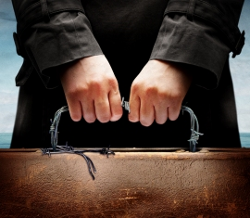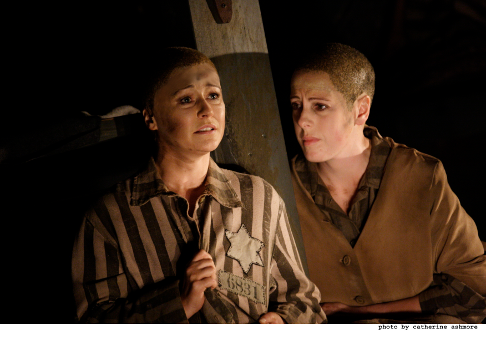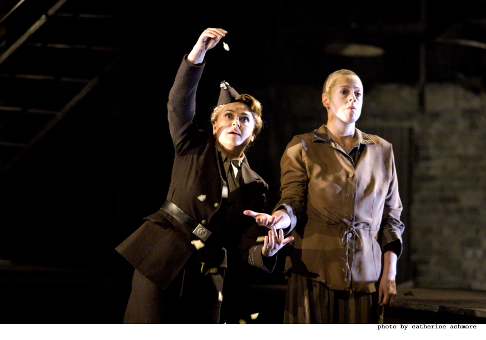
22 Sep 2011
The Passenger, ENO, London
The circumstances behind Mieczysław Weinberg’s The Passenger at the ENO, London, are extraordinary.
English Touring Opera are delighted to announce a season of lyric monodramas to tour nationally from October to December. The season features music for solo singer and piano by Argento, Britten, Tippett and Shostakovich with a bold and inventive approach to making opera during social distancing.
This tenth of ten Live from London concerts was in fact a recorded live performance from California. It was no less enjoyable for that, and it was also uplifting to learn that this wasn’t in fact the ‘last’ LfL event that we will be able to enjoy, courtesy of VOCES8 and their fellow vocal ensembles (more below …).
Ever since Wigmore Hall announced their superb series of autumn concerts, all streamed live and available free of charge, I’d been looking forward to this song recital by Ian Bostridge and Imogen Cooper.
The Sixteen continues its exploration of Henry Purcell’s Welcome Songs for Charles II. As with Robert King’s pioneering Purcell series begun over thirty years ago for Hyperion, Harry Christophers is recording two Welcome Songs per disc.
Although Stile Antico’s programme article for their Live from London recital introduced their selection from the many treasures of the English Renaissance in the context of the theological debates and upheavals of the Tudor and Elizabethan years, their performance was more evocative of private chamber music than of public liturgy.
In February this year, Albanian soprano Ermonela Jaho made a highly lauded debut recital at Wigmore Hall - a concert which both celebrated Opera Rara’s 50th anniversary and honoured the career of the Italian soprano Rosina Storchio (1872-1945), the star of verismo who created the title roles in Leoncavallo’s La bohème and Zazà, Mascagni’s Lodoletta and Puccini’s Madama Butterfly.
Evidently, face masks don’t stifle appreciative “Bravo!”s. And, reducing audience numbers doesn’t lower the volume of such acclamations. For, the audience at Wigmore Hall gave soprano Elizabeth Llewellyn and pianist Simon Lepper a greatly deserved warm reception and hearty response following this lunchtime recital of late-Romantic song.
Collapsology. Or, perhaps we should use the French word ‘Collapsologie’ because this is a transdisciplinary idea pretty much advocated by a series of French theorists - and apparently, mostly French theorists. It in essence focuses on the imminent collapse of modern society and all its layers - a series of escalating crises on a global scale: environmental, economic, geopolitical, governmental; the list is extensive.
For this week’s Live from London vocal recital we moved from the home of VOCES8, St Anne and St Agnes in the City of London, to Kings Place, where The Sixteen - who have been associate artists at the venue for some time - presented a programme of music and words bound together by the theme of ‘reflection’.
'Such is your divine Disposation that both you excellently understand, and royally entertaine the Exercise of Musicke.’
Amongst an avalanche of new Mahler recordings appearing at the moment (Das Lied von der Erde seems to be the most favoured, with three) this 1991 Mahler Second from the 2nd Kassel MahlerFest is one of the more interesting releases.
‘And there was war in heaven: Michael and his angels fought against the dragon; and the dragon fought and his angels, And prevailed not; neither was their place found any more in heaven … that old serpent … Satan, which deceiveth the whole world: he was cast out into the earth, and his angels were cast out with him.’
If there is one myth, it seems believed by some people today, that probably needs shattering it is that post-war recordings or performances of Wagner operas were always of exceptional quality. This 1949 Hamburg Tristan und Isolde is one of those recordings - though quite who is to blame for its many problems takes quite some unearthing.
There was never any doubt that the fifth of the twelve Met Stars Live in Concert broadcasts was going to be a palpably intense and vivid event, as well as a musically stunning and theatrically enervating experience.
‘Love’ was the theme for this Live from London performance by Apollo5. Given the complexity and diversity of that human emotion, and Apollo5’s reputation for versatility and diverse repertoire, ranging from Renaissance choral music to jazz, from contemporary classical works to popular song, it was no surprise that their programme spanned 500 years and several musical styles.
The Academy of St Martin in the Fields have titled their autumn series of eight concerts - which are taking place at 5pm and 7.30pm on two Saturdays each month at their home venue in Trafalgar Square, and being filmed for streaming the following Thursday - ‘re:connect’.
The London Symphony Orchestra opened their Autumn 2020 season with a homage to Oliver Knussen, who died at the age of 66 in July 2018. The programme traced a national musical lineage through the twentieth century, from Britten to Knussen, on to Mark-Anthony Turnage, and entwining the LSO and Rattle too.
With the Live from London digital vocal festival entering the second half of the series, the festival’s host, VOCES8, returned to their home at St Annes and St Agnes in the City of London to present a sequence of ‘Choral Dances’ - vocal music inspired by dance, embracing diverse genres from the Renaissance madrigal to swing jazz.
Just a few unison string wriggles from the opening of Mozart’s overture to Le nozze di Figaro are enough to make any opera-lover perch on the edge of their seat, in excited anticipation of the drama in music to come, so there could be no other curtain-raiser for this Gala Concert at the Royal Opera House, the latest instalment from ‘their House’ to ‘our houses’.
"Before the ending of the day, creator of all things, we pray that, with your accustomed mercy, you may watch over us."

The circumstances behind Mieczysław Weinberg’s The Passenger at the ENO, London, are extraordinary.
Everything about the Holocaust packs a powerful emotional punch, and rightly so.
Something insane descended on this world at that time — in Nazi-occupied lands, in Stalinist Russia, and beyond, that was so catastrophic that we must never forget. Zofia Posmysz’s original novel was based on her own experiences at Auschwitz, and Weinberg’s family perished. Posmysz appears at the end of performances and is deservedly applauded, for she symbolizes the triumph of good over evil, values we all want to believe in. This gives The Passenger such potent extra-musical experience that it’s more a communal homage than an opera.
David Pountney’s production, premiered at Bregenz, is amazing. Visually it’s so striking that it takes your breath away. This production, with designs by Johan Engels, costumes by Marie-Jeanne Lecca and lighting by Fabrice Kebour makes the best possible case for this opera. No-one can come away unmoved by this set, or by the intelligence of the direction. This production absolutely makes the case for this opera as theatrical experience.
Everything’s bleached and pristine, so unnaturally bright it hurts the eye. Like Lisa Franz herself. Franz was a camp guard in Auschwitz. Lisa and Walter have been married 15 years but he’s never known about her past. “But I did nothing bad” she says. Perhaps. However, anyone connected to Auschwitz was tainted, just by association. Even victims suffer survivor guilt. Think of Primo Levi.
The revelation was provoked by the sight of another passenger on board ship who reminds Lisa of Marta, her favoured prisoner. In the original book, Posmysz wondered what had happened to her own persecutor, who’d apparently escaped retribution, so it’s an excellent plot device, framing an account of life in camp. Perhaps this is a key to interpreting the two parts of the opera. The First Act is more consciously dramatic, while in the Second, drama is imposed on a “normal” account of a thoroughly abnormal situation.
Music and text in the First Act are didactic to an extreme, which makes for good theatre. The orchestration is loud, strident and jarring, whipping up an excited emotional response. Subtle it is not, though, for the text is unbelievably stiff. Maybe it’s the English translation, originally by David Fanning, adapted by David Pountney for this performing edition. Perhaps they’re deliberately trying to present the singers as automatons, but this undermines the very real emotions characters like these might have. In Lisa’s case this is understandable because the character is in such denial she’s hardly human. Excellent performance by Michelle Breedt. If we never get to depths with what makes Lisa what she is, it’s not through any lapse in Breedt’s performance. It’s the script. Lisa’s husband, Walter, for example, reacts to her revelation in stylized clichés. Even the sturdy Kim Begley can’t make Walter feel real. Walter’s not evil. He, too, has been betrayed by the big lie, and deserves more sympathy.
Unfortunately, characterizations in the Second Act are equally cardboard. This is by far the better part of the opera in musical terms, where superficial but emotive B-movie shock gives way to moments of lovely writing, particularly in the arias where the women sing of their pasts and express their solidarity for one another. Excellent playing — evocative basses and deeper strings, a beautiful flute line. The ENO orchestra, conducted by Richard Armstrong, at its best.
 Carolyn Dobbin as Hannah and Giselle Allen as Marta
Carolyn Dobbin as Hannah and Giselle Allen as Marta
The script, however, doesn’t reflect the greater subtlety in the score. Giselle Allen plays Marta with statuesque dignity. Her stage presence fills the role, but it’s her ability that comes over, rather than the material she has to work with. Each of the other women are characterized by nationality rather than much personality, though what they sing is uplifting. Leigh Melrose.s Tadeusz is strongly sung, but the subplot of love, violin and mad waltz has more potential than is developed.
There’s a lot of Holocaust-exploitation around, but The Passenger is most certainly sincere and honourable. The problem may be in the inherent difficulty of turning subjective experience into slightly more objective art. Such events are so painful that it’s perfectly human to need to block the extremes of pain. Good intentions don’t necessarily lead to great art or depth of perception. Again, remember Primo Levi and the price he paid for his brilliance.
Another difficulty stems from the circumstances in which the opera was written. Weinberg was in the Soviet Union, a repressive regime, where political considerations prevailed over art. The aria about “the freedom of the steppes” rings hollow when you think of reality. Moreover, there was and is a long history of anti-semitism in Russia and in Poland. Different solutions to Hitler, but similar agendas regarding Jews. Obviously not all inmates of Auschwitz were Jewish, and thousands of Catholic Poles were exterminated too. They must not be forgotten. But the world associates Auschwitz with the Holocaust and with Jews, and with death factories. So it’s not easy to hear lines like “I’m a Jew, we’re meant to die”, even if it’s in context. No-one is meant to die. There are millions of individual stories, all important, but the Holocaust was so all-encompassing that it needs broad perspective.
 Michelle Breedt as Lisa and Giselle Allen as Marta
Michelle Breedt as Lisa and Giselle Allen as Marta
Since this production was based on a new performing edition, there might have been opportunities to tighten the orchestration and especially the libretto, by Alexander Medvedev. Even Poutney has said, it was the subject tof this opera that drew him to Weinberg. What works fine in a novel does not lend itself to the restraints of opera. The Passenger is Weinberg’s masterpiece, far more daring than The Portrait, and as such deserves stringent editing. Weinberg may now be highly fashionable, but he isn’t Shostakovich. Even As a theatrical and emotive experience, The Passenger works in this production. But more depth and less breadth would make it more satisfying as opera.
Incidentally, I kept hearing Peter Grimes (particularly the Sea Interludes) in this music, so I was delighted afterwards to read David Nice’s programme notes about the influence of Benjamin Britten. Nice mentions Peter Grimes in connection with Shostakovich, but perhaps Weinberg also knew Peter Grimes and what the character meant. Another reminder that Aldeburgh was not insular and is part of a greater European tradition.
Anne Ozorio